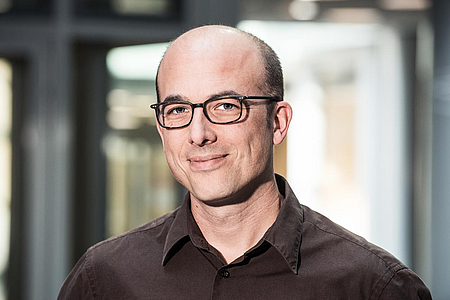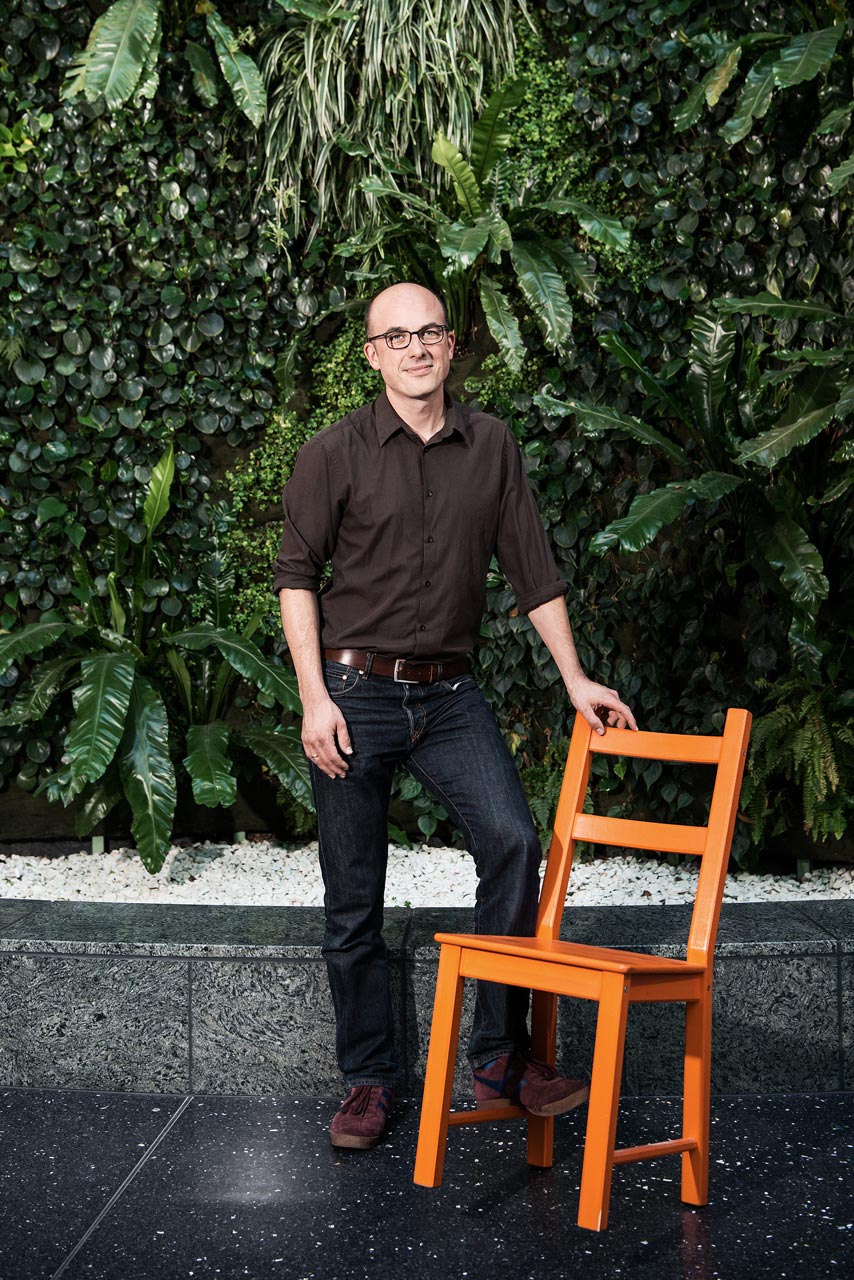The methodological conscience of medicine
In appointing Daniel Strech Professor for Translational Bioethics, the life sciences in Berlin are sending a strong signal about quality assurance in medical research. His research team is based at the Quest Center for Transforming Biomedical Research, the aim of which is to increase the quality and the usefulness of biomedical research. In our talk, Daniel Strech told us where and how quality and usefulness are to be specifically increased and why exactly Berlin constitutes a perfect hub for such a topic.
Professor Strech, after gaining your licence to practice medicine, you quickly turned to medical ethics. Was there a specific event that made you think “Man, this is unethical...”?
I studied at a campus university where I couldn’t go home between the courses. So parallel to my medical studies, I used to attend philosophy lectures and also wrote my doctoral thesis with a professor from the Philosophy Faculty. Later on at the clinic, I felt that perspective was missing, even though there are many topics relevant for clinical practice. For example, I was particularly interested in the movement in support of evidence-based medicine. A formative event for me was reading a book on the early detection of cancer, shortly after taking my final university examination. I felt it was unethical that we give too little thought to the quality of the information that we use as a basis for important decisions – not only in the early detection of cancer, but also in other areas of medicine. Unfortunately, that information is often distorted or not very sound. Over the last 20 years, there have been many advances towards better evidence-based decisions in medicine and also in early cancer detection. However, in translational research itself, this critical and responsible handling of evidence is still absent in many places.
To help us get a clear picture of this, can you describe a specific case?
Research could make a very important contribution towards evidence that is as little distorted as possible if research results were published promptly and in a useful form. Often, however, research results are unfortunately not published at all or only very selectively. There are different potential solutions to this problem, and we’re working on them. For example, for some time there’s been an initiative to encourage researchers to make the summary results of studies available to the people within twelve months in the database in which they initially had to register their study. However, many think that if the results are already available in the register, they will no longer be able to publish the results in prestigious journals later on. Nevertheless, the journals have long announced their support for the scheme. Uploading the summary results wouldn’t take longer than one or two hours at most, but hardly anyone does it. So nowadays the register shows you which studies exist, but in many cases you don’t know the results – even though that would mean great added value for research and patient care. The idea behind the QUEST Center is to study the current situation empirically, and to communicate the importance of such initiatives. The World Health Organization recommends that results from clinical research be published within two years of completing the study. At present, only 40 per cent of all clinical researchers in Germany manage to do that.
In bioethics, does one automatically play the role of the “bad conscience of medicine”?
A bad conscience may sometimes be the consequence when you self-critically examine the currently insufficient implementation of ethical principles in research. However, I do of course regard the role of bioethics in a much more constructive way, which is why I’d rather call it a methodogical conscience or conscience of intrinsic value. Bioethics is a vehicle that allows us to do research in the first place. Society only tolerates and finances ethical research. The type of Translational Bioethics that we apply in my research group aims to promote the implementation of socially accepted ethical principles in research practice.

Funding program
Recruiting Grants
Funding period
2018 – 2022
Research area
Medical ethics
Title
Professor of Translational Bioethics
Institution
Charité – Universitätsmedizin Berlin and Berlin Institute of Health (BIH)
Since 2018
Professor of Translational Bioethics at the Berlin Institute of Health and at the Charité – Universitätsmedizin Berlin
2014 – 2018
Heisenberg Professorship "Ethics and Governance in biomedical research and innovation", Institute for History, Ethics and Philosophy of Medicine, Hannover Medical School
2011
Habilitation, "Concept and findings of evidence-based ethics in medical rationing","Ethics and theory in medicine and public health", Hannover Medical School
It isn’t about immediately imposing sanctions or passing new laws. Rather, we need to create ethical parameters that are practicable for medical research. For example, you ought to be rewarded in the context of your scientific career if you publish not just a few, but all your own research results. We don’t have this parameter at present, however. On the contrary, the current system above all rewards articles that are published in journals that have high impact factors, and which generally publish positive, spectacular results. This is a key reason why many research results disappear into a drawer. However, only a complete, undistorted picture of all research results would allow us to carry out evidence-based research. It would be best if researchers take on such tasks themselves or at least actively participate in our QUEST projects. They can gauge the barriers in research practice much better. We therefore discuss together with them, based on our results, what possible recommendations should be like. A step towards quality-oriented parameters would be the value-based allocation of funds, in addition to the established achievement orientation. The appointment procedure of the Charité already allows candidates to score points if they publish studies promptly or upload the key results. However, impact factors and external funds also remain relevant in that respect.
You work with politicians, clinicians and patients. What is that collaboration like in concrete terms?
Our empirical studies are usually followed by stakeholder research. We discuss with the different groups of stakeholders how something can be optimized in practice. Sometimes, the collaboration is already part of the data collection process, as for example in interview research. One major topic is registers for animal studies.
How can we increase the value of animal research and the publication of results? We try to find answers that are as evidence-based and participative as possible. We’ve talked to researchers, entrepreneurs, politicians and activists in twenty in-depth interviews and hundreds of questionnaire surveys. Based on the results, we draw up a spectrum of potential solutions. This way, we meet with the stakeholders every day, even if not always personally.
Currently, the debate about animal experiments seems to be quite heated, with positions that appear to be almost irreconcilable in some ways. Is there a communication problem here?
I’d like to answer that in two parts. On the one hand, there was a communication problem insofar as science itself has communicated too little about the benefits of animal research for medicine and about the high standards for protecting laboratory animals. That problem has been mitigated over the past few years through various initiatives. A second communication problem, which is unfortunately still ongoing, is due to the fact that the validity and the publication practice in the case of animal experiments is discussed too little. Here, even the industry says that it often doesn’t trust the results that come out of academic animal experiments. Almost all the published reports are positive, and the methods are often questionable, studies are rarely randomized, and results are often not gathered blindly. In Germany, the law stipulates that animals should not be harmed, and no research should be carried out on them if it brings no clear gains in knowledge for science or possible improvements in patient care. If one doesn’t allow those benefits through not publishing the results, that deal is in fact cancelled retrospectively.
What factors played a role in your decision to come to Berlin?
There’s no better place for me at the moment. No other location in Germany is as clearly focused on promoting the intrinsic value of research. Although ethics has been a compulsory subject at all medical universities since 2004, it is usually only represented by one or two people. In building up my research team, the Charité and the BIH are placing still greater focus on quality assurance in research. Added to that is the interdisciplinarity and the integration in an institute like QUEST – where, besides my ethics research team, other experts in quality promotion in animal research, data science and reward systems also work. In addition, the Berlin universities and other non-university institutions employ leading experts in scientific fields which, in view of the methodology, represent an important peer group: the social sciences or higher education research. The fact that QUEST is in such close cooperation with all these other stakeholders is something that’s found nowhere else in all of Europe.
Ten years ago, you moved from Berlin to Hannover when you were appointed to a post. Now, you‘re back in the capital. How has Berlin changed, in your view?
Regarding the scientific aspect, a lot was renovated. The BIH and many new Charité buildings didn’t yet exist back then. In the 1990s, my wife noticed how entire city districts were being renovated completely; when we moved from Berlin ten years ago, the big construction projects were already underway. So it isn’t the case that I would hardly recognize the city today. Even though Jens Spahn claims he can no longer order his coffee in German, it’s never happened to me.
You could see it in a positive way and say that Berlin’s more international now, and that also applies to research.
During the few weeks since my return, I’ve already noticed that we work in a very international way here compared to other German centers. And although this was also the case in my own and in a few other research teams in Hannover, it was more of an exception there – whereas here, it goes without saying. Here, we have cooperation projects and also personal exchange with Oxford, Utrecht, Stanford, Bristol and Edinburgh. In fact, this was another important factor that motivated me to come to Berlin.
Well, we’re excited to see what synergies will result from this over the next few years and wish your newly founded research team much success in making the ethical parameters more practicable for the researcher.
September 2018 / MM
